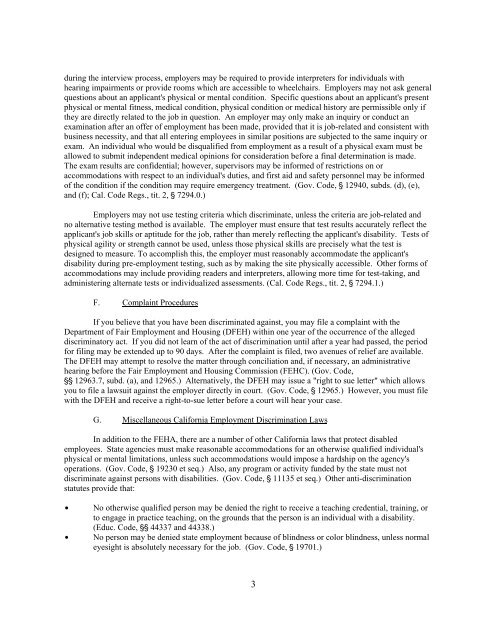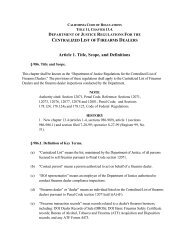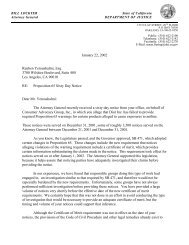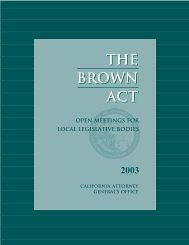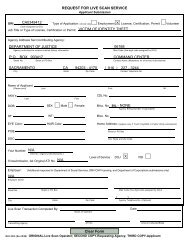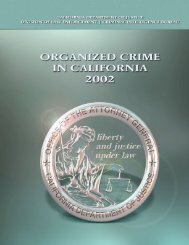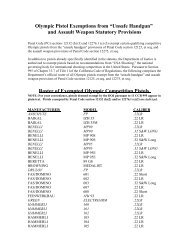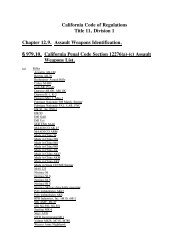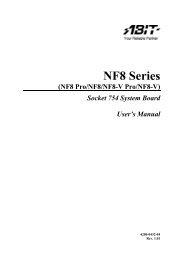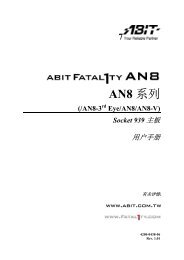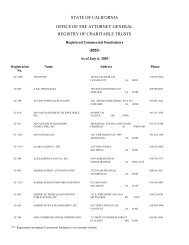Legal Rights of Persons With Disabilities - Ossh.com
Legal Rights of Persons With Disabilities - Ossh.com
Legal Rights of Persons With Disabilities - Ossh.com
Create successful ePaper yourself
Turn your PDF publications into a flip-book with our unique Google optimized e-Paper software.
during the interview process, employers may be required to provide interpreters for individuals with<br />
hearing impairments or provide rooms which are accessible to wheelchairs. Employers may not ask general<br />
questions about an applicant's physical or mental condition. Specific questions about an applicant's present<br />
physical or mental fitness, medical condition, physical condition or medical history are permissible only if<br />
they are directly related to the job in question. An employer may only make an inquiry or conduct an<br />
examination after an <strong>of</strong>fer <strong>of</strong> employment has been made, provided that it is job-related and consistent with<br />
business necessity, and that all entering employees in similar positions are subjected to the same inquiry or<br />
exam. An individual who would be disqualified from employment as a result <strong>of</strong> a physical exam must be<br />
allowed to submit independent medical opinions for consideration before a final determination is made.<br />
The exam results are confidential; however, supervisors may be informed <strong>of</strong> restrictions on or<br />
ac<strong>com</strong>modations with respect to an individual's duties, and first aid and safety personnel may be informed<br />
<strong>of</strong> the condition if the condition may require emergency treatment. (Gov. Code, ' 12940, subds. (d), (e),<br />
and (f); Cal. Code Regs., tit. 2, ' 7294.0.)<br />
Employers may not use testing criteria which discriminate, unless the criteria are job-related and<br />
no alternative testing method is available. The employer must ensure that test results accurately reflect the<br />
applicant's job skills or aptitude for the job, rather than merely reflecting the applicant's disability. Tests <strong>of</strong><br />
physical agility or strength cannot be used, unless those physical skills are precisely what the test is<br />
designed to measure. To ac<strong>com</strong>plish this, the employer must reasonably ac<strong>com</strong>modate the applicant's<br />
disability during pre-employment testing, such as by making the site physically accessible. Other forms <strong>of</strong><br />
ac<strong>com</strong>modations may include providing readers and interpreters, allowing more time for test-taking, and<br />
administering alternate tests or individualized assessments. (Cal. Code Regs., tit. 2, ' 7294.1.)<br />
F. Complaint Procedures<br />
If you believe that you have been discriminated against, you may file a <strong>com</strong>plaint with the<br />
Department <strong>of</strong> Fair Employment and Housing (DFEH) within one year <strong>of</strong> the occurrence <strong>of</strong> the alleged<br />
discriminatory act. If you did not learn <strong>of</strong> the act <strong>of</strong> discrimination until after a year had passed, the period<br />
for filing may be extended up to 90 days. After the <strong>com</strong>plaint is filed, two avenues <strong>of</strong> relief are available.<br />
The DFEH may attempt to resolve the matter through conciliation and, if necessary, an administrative<br />
hearing before the Fair Employment and Housing Commission (FEHC). (Gov. Code,<br />
'' 12963.7, subd. (a), and 12965.) Alternatively, the DFEH may issue a "right to sue letter" which allows<br />
you to file a lawsuit against the employer directly in court. (Gov. Code, ' 12965.) However, you must file<br />
with the DFEH and receive a right-to-sue letter before a court will hear your case.<br />
G. Miscellaneous California Employment Discrimination Laws<br />
In addition to the FEHA, there are a number <strong>of</strong> other California laws that protect disabled<br />
employees. State agencies must make reasonable ac<strong>com</strong>modations for an otherwise qualified individual's<br />
physical or mental limitations, unless such ac<strong>com</strong>modations would impose a hardship on the agency's<br />
operations. (Gov. Code, ' 19230 et seq.) Also, any program or activity funded by the state must not<br />
discriminate against persons with disabilities. (Gov. Code, ' 11135 et seq.) Other anti-discrimination<br />
statutes provide that:<br />
$ No otherwise qualified person may be denied the right to receive a teaching credential, training, or<br />
to engage in practice teaching, on the grounds that the person is an individual with a disability.<br />
(Educ. Code, '' 44337 and 44338.)<br />
$ No person may be denied state employment because <strong>of</strong> blindness or color blindness, unless normal<br />
eyesight is absolutely necessary for the job. (Gov. Code, ' 19701.)<br />
3


